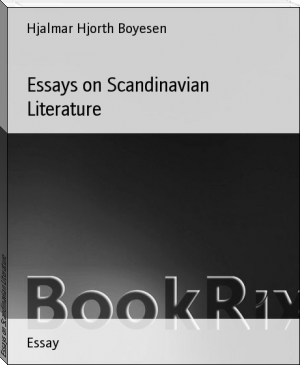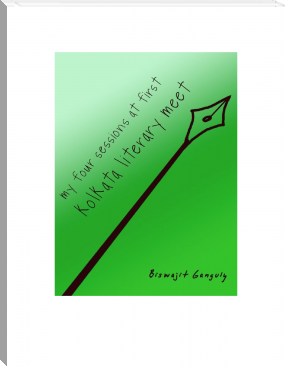Essays on Scandinavian Literature, Hjalmar Hjorth Boyesen [best ebook reader ubuntu txt] 📗

- Author: Hjalmar Hjorth Boyesen
Book online «Essays on Scandinavian Literature, Hjalmar Hjorth Boyesen [best ebook reader ubuntu txt] 📗». Author Hjalmar Hjorth Boyesen
HANS CHRISTIAN ANDERSEN[17]
[17] A portion of this essay appeared originally in "The Dial" of Chicago.
Hans Christian Andersen was a unique figure in Danish literature, and a solitary phenomenon in the literature of the world. Superficial critics have compared him with the Brothers Grimm; they might with equal propriety have compared him with Voltaire or with the man in the moon. Jacob and Wilhelm Grimm were scientific collectors of folk-lore, and rendered as faithfully as possible the simple language of the peasants from whose lips they gathered their stories. It was the ethnological and philological value of the fairy-tale which stimulated their zeal; its poetic value was of quite secondary significance. With Andersen the case was exactly the reverse. He was as innocent of scientific intention as the hen who finds a diamond on a dunghill is of mineralogy. It was the poetic phase alone of the fairy-tale which attracted him; and what is more, he saw poetic possibilities where no one before him had ever discovered them. By the alchemy of genius (which seems so perfectly simple until you try it yourself) he transformed the common neglected nonsense of the nursery into rare poetic treasure. Boots, who kills the ogre and marries the princess--the typical lover in fiction from the remotest Aryan antiquity down to the present time--appears in Andersen in a hundred disguises, not with the rudimentary features of the old story, but modernized, individualized, and carrying on his shield an unobtrusive little moral. In "Jack the Dullard" he comes nearest to his primitive prototype, and no visible effort is made to refine him. In "The Most Extraordinary Thing" he is the vehicle of a piece of social satire, and narrowly escapes the lot which the Fates seem especially to have prepared for inventors, viz., to make the fortune of some unscrupulous clown while they themselves die in poverty. In "The Porter's Son" he is an aspiring artist, full of the fire of genius, and he wins his princess by conquering that many-headed ogre with which every self-made man has to battle--the world's envy, and malice, and contempt for a lowly origin. It is easy to multiply examples, but these may suffice.
In another species of fairy-tale, which Andersen may be said to have invented, incident seems to be secondary to the moral purpose, which is yet so artfully hidden that it requires a certain maturity of intellect to detect it. In this field Andersen has done his noblest work and earned his immortality. Who can read that marvellous little tale, "The Ugly Duckling," without perceiving that it is a subtle, most exquisite revenge the poet is taking upon the humdrum Philistine world, which despised and humiliated him, before he lifted his wings and flew away with the swans, who knew him as their brother? And yet, as a child, I remember reading this tale with ever fresh delight, though I never for a moment suspected its moral. The hens and the ducks and the geese were all so vividly individualized, and the incidents were so familiar to my own experience, that I demanded nothing more for my entertainment. Likewise in "The Goloshes of Fortune" there is a wealth of amusing adventures, all within the reach of a child's comprehension, which more than suffices to fascinate the reader who fails to penetrate beneath the surface. The delightful satire, which is especially applicable to Danish society, is undoubtedly lost to nine out of ten of the author's foreign readers, but so prodigal is he both of humorous and pathetic meaning, that every one is charmed with what he finds, without suspecting how much he has missed. "The Little Mermaid" belongs to the same order of stories, though the pathos here predominates, and the resemblance to De la Motte Fouqué's "Undine" is rather too striking. But the gem of the whole collection, I am inclined to think, is "The Emperor's New Clothes," which in subtlety of intention and universality of application rises above age and nationality. Respect for the world's opinion and the tyranny of fashion have never been satirized with more exquisite humor than in the figure of the emperor who walks through the streets of his capital in _robe de nuit_, followed by a procession of courtiers, who all go into ecstasies over the splendor of his attire.
It was not only in the choice of his theme that Andersen was original. He also created his style, though he borrowed much of it from the nursery. "It was perfectly wonderful," "You would scarcely have believed it," "One would have supposed that there was something the matter in the poultry-yard, but there was nothing at all the matter"--such beginnings are not what we expect to meet in dignified literature. They lack the conventional style and deportment. No one but Andersen has ever dared to employ them. As Dr. Brandes has said in his charming essay on Andersen, no one has ever attempted, before him, to transfer the vivid mimicry and gesticulation which accompany a nursery tale to the printed page. If you tell a child about a horse, you don't say that it neighed, but you imitate the sound; and the child's laughter or fascinated attention compensates you for your loss of dignity. The more successfully you crow, roar, grunt, and mew, the more vividly you call up the image and demeanor of the animal you wish to represent, and the more impressed is your juvenile audience. Now, Andersen does all these things in print: a truly wonderful feat. Every variation in the pitch of the voice--I am almost tempted to say every change of expression in the story-teller's features--is contained in the text. He does not write his story, he tells it; and all the children of the whole wide world sit about him and listen with, eager, wide-eyed wonder to his marvellous improvisations.[18]
[18] Brandes: Kritiker og Portraiter, p. 303.
In reading Andersen's collected works one is particularly impressed with the fact that what he did outside of his chosen field is of inferior quality--inferior, I mean, judged by his own high standard, though in itself often highly valuable and interesting. "The Improvisatore," upon which, next to "The Wonder-Tales," his fame rests, is a kind of disguised autobiography which exhibits the author's morbid sensibility and what I should call the unmasculine character of his mind,[19] To appeal to the reader's pity in your hero's behalf is a daring experiment, and it cannot, except in brief scenes, be successful. A prolonged strain of compassion soon becomes wearisome, and not the worthiest object in the world can keep one's charity interested through four hundred pages. Antonio, in "The Improvisatore," is a milksop whom the author, with a lavish expenditure of sympathy, parades as a hero. He is positively ludicrous in his pitiful softness, vanity, and humility. That the book nevertheless remains unfailingly popular, and is even yet found in the satchel of every Roman tourist, is chiefly due to the poetic intensity with which the author absorbed and portrayed every Roman sight and sound. Italy throbs and glows in the pages of "The Improvisatore"--the old vagabond Italy of pre-Garibaldian days, when priests and bandits and pretty women divided the power of Church and State. Story's "Roba di Roma," Augustus Hare's "Walks in Rome," and all the other descriptions of the Eternal City, are but disguised guide-books, feeble and pale performances, when compared with Andersen's beautiful romance.
[19] R. L. Stevenson in speaking of the "Character of Dogs" makes the following cruel observation: "Hans Christian Andersen, as we behold him in his startling memoirs, thrilling from top to toe with an excruciating vanity and scouting even along the streets for the shadows of offence--here was the talking dog."--Memories and Portraits, p. 196.
The same feminine sentimentality which, in spite of its picturesqueness, makes "The Improvisatore" unpalatable to many readers, is still more glaringly exhibited in "O. T." and "The Two Baronesses." In "The Story of My Life" the same quality asserts itself on every page in the most unpleasant manner. The author makes no effort to excite the reader's admiration, but he makes constant appeals to his sympathy. Nevertheless this autobiography rivals in historic and poetic worth Rousseau's "Confessions" and Benvenuto Cellini's "Life." The absolute candor with which Andersen lays bare his soul, the complete intentional or unintentional self-revelation, gives a psychological value to the book which no mere literary graces could bestow. I confess, until I had the pleasure of making Andersen's acquaintance, "The Fairy Tale of My Life" impressed me unpleasantly. After I had by personal intercourse possessed myself of the clew to the man's character, I judged differently. Andersen remained, until the day of his death, a child. His innocence was more than virginal; his unworldliness simply inconceivable. He carried his heart on his sleeve, and invited you to observe what a soft, tender, and sensitive heart it was. He had the harmless vanity of a child who has a new frock on. He was fidgety and unhappy if anybody but himself was the centre of attraction; and guilelessly happy when he could talk and be admired and sympathized with. His conversation was nearly always about himself, or about the kings and princes and lofty personages who had graciously deigned to take notice of him. He was a tuft-hunter of a rare and curious sort; not because he valued the glory reflected upon himself by royal acquaintances, but because the pomp and splendor of a court satisfied his thirst for the marvellous. A king seemed to him, as to the boy who reads his fairy-tales, something grand and remote; and in invading this charmed sphere he seemed to have invaded his own fairy-tales, and to live actually in the fabulous region of wonders in which his fancy revelled. He conceived of his life as a fairy-tale, and delighted in living up to his own ideal of living. The very title of his autobiography in Danish (_Mit Livs Eventyr_) shows this conclusively; and it ought to have been rendered in English "The Fairy-Tale of My Life." "The Story of My Life," as Mr. Scudder has translated it, would have been in the original "Mit Livs Historie," a very common title, by the way, for an autobiography, while _Mit Livs Eventyr_ is entirely unique.
The feeling of the marvellous pervades the book from beginning to end. The prose facts of life had but a remote and indistinct existence to the poet, and he blundered along miserably in his youth, supported and upheld by a dim but unquenchable aspiration. He commiserated himself, and yet felt that there was something great in store for him because of his exceptional endowment. Every incident in his career he treated as if it were a miracle, which required the suspension of the laws of the universe for its performance. God was a benevolent old man with a long beard (just as he was depicted in old Dr. Luther's Catechism) who sat up in the skies and spent his time chiefly in managing the affairs of Hans Christian Andersen as pleasantly as possible; and Hans Christian was duly grateful, and cried on every third or fourth page at the thought of the goodness of God and man. Sometimes, for a change, he cried at the wickedness of the latter, and marvelled, with the _naïveté_ of a spoiled child, that there should be such dreadful people in the world, who should persist in misunderstanding and misrepresenting him. Those who were good to him he





Comments (0)